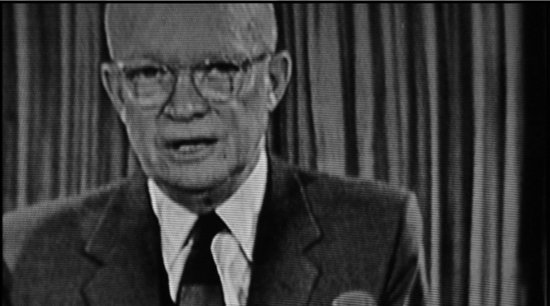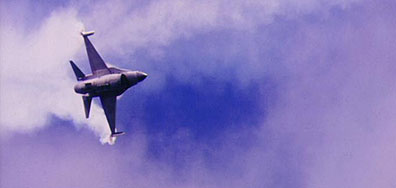Add one more lie to the pile: “On May 29, 2003, 50 days after the fall of Baghdad, President Bush proclaimed a fresh victory for his administration in Iraq: Two small trailers captured by U.S. and Kurdish troops had turned out to be long-sought mobile ‘biological laboratories.’ He declared, ‘We have found the weapons of mass destruction.’…But even as Bush spoke, U.S. intelligence officials possessed powerful evidence that it was not true.” The Washington Post recounts step-by-step the tale of Dubya’s fake WMD trailers, sending White House Press Secretary Scott McClellan into a paroxysm of aggressively circular spin. As it turns out, even though Dubya had been notified the trailers were a red herring two days before his above comments, “for nearly a year, administration and intelligence officials continued to publicly assert that the trailers were weapons factories.“
Tag: Weaponsgate
How ’bout an exploding cigar?
“The memo also shows that the president and the prime minister acknowledged that no unconventional weapons had been found inside Iraq. Faced with the possibility of not finding any before the planned invasion, Mr. Bush talked about several ways to provoke a confrontation, including a proposal to paint a United States surveillance plane in the colors of the United Nations in hopes of drawing fire, or assassinating Mr. Hussein.” The NYT relates the details of a January 2003 pre-war meeting between Bush and Blair, and it’s not pretty. Not surprisingly (and like the July 2002 Downing Street memos, the recollections of Paul O’Neill, and countless other sources), this new material confirms that Dubya and the neocons wanted a war in Iraq, come hell or high water.
Fight Club.
“In the councils of government, we must guard against the acquisition of unwarranted influence, whether sought or unsought, by the military-industrial complex. The potential for the disastrous rise of misplaced power exists and will persist. We must never let the weight of this combination endanger our liberties or democratic processes.” That flaming liberal Dwight Eisenhower’s somber farewell address to the nation is the historical and thematic anchor for Eugene Jarecki’s documentary Why We Fight, a sobering disquisition on American militarism and foreign policy since 9/11. In essence, Why We Fight is the movie Fahrenheit 9/11 should have been. Like F911, this film preaches to the choir, but it also makes a more substantive critique of Dubya diplomacy and the 9/11-Iraq switcheroo, with much less of the grandstanding that marred Moore’s earlier documentary (and drove right-wing audiences berzerk.)
Sadly, the basic tale here is all-too-familiar by now. Ensconced in Dubya’s administration from the word go, the right-wing think-tank crowd (Wolfowitz, Perle, Kristol, etc.) used the tragedy of 9/11 as a pretext to enact all their neocon fantasies (spelled out in this 2000 Project for a New American Century report), beginning in Iraq. Taken into consideration with Cheney the Military-Contractor-in-Chief doling out fat deals to his Halliburton-KBR cronies from the Vice-President’s office, and members of Congress meekly signing off on every military funding bill that comes down the pike (partly because, as the film points out, weapons systems such as the B-1 or F-22 have a part built in every state), it seems uncomfortably clear that President Eisenhower’s grim vision has come to pass.
To help him rake this muck, Jarecki shrewdly gives face-time not only to learned critics of recent foreign-policy — CIA vet Chalmers Johnson, Gore Vidal (looking unwell) — but also to the neocons themselves. Richard Perle is here, saying (as always) insufferably self-serving things, and Bill Kristol glows like a kid in a candy store when he gets to talk up his role in fostering Dubya diplomacy. (Karen Kwiatkowski, a career military woman who watched the neocon coup unfold within the corridors of the Pentagon, also delivers some keen insights.) And, when discussing the corruption that festers in the heart of our Capitol, Jarecki brings out not only Charles Lewis of the Center for Public Integrity but that flickering mirage of independent-minded Republicanism, John McCain. (In fact, Jarecki encapsulates the frustrating problem with McCain in one small moment: Right after admitting to the camera that Cheney’s no-bid KBR deals “look bad”, the Senator happens to get a call from the Vice-President. In his speak-of-the-devil grimace of bemused worry, you can see him mentally falling into line behind the administration, as always.)
To be sure, Why We Fight has some problems. There’s a central tension in the film between the argument that Team Dubya is a corrupt administration of historical proportions and the notion that every president since Kennedy has been party to an increasingly corrupt system, and it’s never really resolved satisfactorily here. Jarecki wants you to think that this documentary is about the rise of the Imperial Presidency across five decades, but, some lip service to Tonkin notwithstanding, the argument here is grounded almost totally in the Age of Dubya. (I don’t think it’s a bad thing, necessarily, but it is the case.) And, sometimes the critique seems a little scattershot — Jarecki seems to fault the Pentagon both for KBR’s no-bid contracts and, when we see Lockheed and McDonnell-Douglas salesmen going head-to-head, for bidding on contracts. (Still, his larger point is valid — As Chalmers Johnson puts it, “When war becomes that profitable, you’re going to see more of it.“)
Also, the film loses focus at times and meanders along tangents — such as the remembrances of two Stealth Fighter pilots on the First Shot Fired in the Iraq war, or the glum story of an army recruit in Manhattan looking to turn his life around. This latter tale, along with the story of Wilton Sekzer, a retired Vietnam Vet and NYPD sergeant who lost his son on 9/11 and wants somebody to pay, are handled with more grace and less showmanship than similar vignettes in Michael Moore’s film, but they’re in the same ballpark. (As an aside, I was also somewhat irked by shots of NASA thrown in with the many images of missile tests and ordnance factories. Ok, both involve rockets, research, and billions of dollars, but space exploration and war are different enough goals that such a comparison merits more unpacking.)
Nevertheless, Why We Fight is well worth-seeing, and hopefully, this film will make it out to the multiplexes. If nothing else, it’ll do this country good to ponder anew both a president’s warning about the “disastrous rise of misplaced power,” and a vice-president’s assurance that we’ll be “greeted as liberators.”
Lies about Lies.
Thanks to more lies emanating from the Dubya administration, the Congressional Research Service is forced to set the record straight: Dubya saw more prewar intelligence than Congress. “The Bush administration has routinely denied Congress access to documents, saying it would have a chilling effect on deliberations. The report…concludes that the Bush administration has been more restrictive than its predecessors in sharing intelligence with Congress.“
Mea Culpa, Sort-of.
“It is true that much of the intelligence turned out to be wrong. As president I am responsible for the decision to go into Iraq.” In his final speech on Iraq before tomorrow’s elections, (text) Dubya admits the case for war was FUBAR, while insisting it was a good idea anyway. (“The United States did not choose war — the choice was Saddam Hussein’s.“) Of course, Bush neglected to mention that it was he, Cheney, Rumsfeld, et al who cherry-picked through the available intelligence and continued to recite claims they knew to be false. Still, for someone who’s seems pathologically incapable of accepting reality at times, this has to be considered a step forward.
Truth-Challenged Cheney (Again).
“What was striking about Cheney’s assault was that while denying critics’ charges of manipulation and dishonesty involving prewar intelligence, he resorted to exactly the tactics that inspired the criticism. As he did with the prewar intelligence, Cheney told no outright lies, but he exaggerated the case, picked only evidence he liked, and ignored the caveats.” In case it wasn’t obvious, Slate‘s John Dickerson explains how Cheney is still misrepresenting the lead-up to war. (In fact, he did it again today, although at least he didn’t join his congressional colleagues in their recent spate of Murtha-bashing.) But, really, can we expect any less from the administration that brought us imaginary WMDs and the phantom Iraq-9/11 connection? Like George Costanza at his worst moments, these jokers have been lying so long they’ve lost sight of the truth.
Shading the Truth (Again).
“President Bush and his national security adviser have answered critics of the Iraq war in recent days with a two-pronged argument: that Congress saw the same intelligence the administration did before the war, and that independent commissions have determined that the administration did not misrepresent the intelligence. Neither assertion is wholly accurate.“ Update: Slate‘s Fred Kaplan parses Dubya’s speech further.
Adding Insult to Intelligence Failures.
As McCain calls for changes in Dubya’s Iraq strategy, White House National Security advisor Stephen Hadley inaugurates Dubya’s comeback plan, which will get more run in a presidential speech today. Step One: Call the Dems out on their pro-war votes. “‘Some of the critics today,’ Hadley added, ‘believed themselves in 2002 that Saddam Hussein had weapons of mass destruction, they stated that belief, and they voted to authorize the use of force in Iraq because they believed Saddam Hussein posed a dangerous threat to the American people.‘” Well, yes, but if Dems were relying on faulty and doctored intelligence to come to that supposition in 2002, that only brings us back to the $64,000 question: What exactly happened to our prewar intelligence once it reached the White House?
Grey Lady Down.
“Even before I went to jail, I had become a lightning rod for public fury over the intelligence failures that helped lead our country to war…I believed then, and still do, that the answer to bad information is more reporting.” To no one’s surprise, Judy Miller “retires” from the New York Times, but not before getting in one last word (and setting up her own website.) Well, she was way wrong on WMD, but she’s right about this: The best thing the NYT can do to restore its credibility after Judy and Jayson Blair would be to lead an investigatory charge into the pre-war Iraq intelligence, and pronto.
Torturing the truth (and taking uncivil liberties.)
Typical Dubya Doublespeak: Just as Bush tells the world, “We do not torture,” his vice-president continues his quest to exempt the CIA from a congressional torture ban, which would obviously be an unnecessary action were Dubya’s remarks truthful. In related news, the Dems want a wide-ranging inquiry into pre-war intelligence, and members of both parties are concerned about increased “terrorism” inquiries under the Patriot Act.



